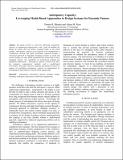Anticipatory Capacity: Leveraging Model-Based Approaches to Design Systems for Dynamic Futures
Author(s)
Rhodes, Donna H.; Ross, Adam Michael
DownloadRhodes-2009-Anticipatory Capacity Leveraging Model-Based Approaches to Design Systems for Dynamic Futures.pdf (381.3Kb)
PUBLISHER_POLICY
Publisher Policy
Article is made available in accordance with the publisher's policy and may be subject to US copyright law. Please refer to the publisher's site for terms of use.
Terms of use
Metadata
Show full item recordAbstract
The paper presents a vision for enhancing anticipatory capacity of engineering organizations, with a goal of enabling the design of systems that can deliver sustained value as the world changes. Anticipatory capacity is the capacity of an organization to continuously develop and apply knowledge acquired through a structured approach to anticipate changing scenarios as needs and context change over time, While anticipation has always had a role in designing systems; the availability of model-based methods has significant implications. Anticipatory capacity extends from three key elements: competencies, methods, and a model-based environment. The paper discusses ongoing and planned research in support of establishing anticipatory capacity in organizations by leveraging the opportunities of model-based engineering.
Date issued
2009-05Department
Massachusetts Institute of Technology. Systems Engineering Advancement Research Initiative; Massachusetts Institute of Technology. Center for Technology, Policy, and Industrial Development; Massachusetts Institute of Technology. Engineering Systems DivisionJournal
International Conference on Model-Based Systems Engineering, 2009. MBSE '09
Publisher
Institute of Electrical and Electronics Engineers
Citation
Rhodes, D.H., and A.M. Ross. “Anticipatory capacity: Leveraging model-based approaches to design systems for dynamic futures.” Model-Based Systems Engineering, 2009. MBSE '09. International Conference on. 2009. 46-51. ©2009 IEEE.
Version: Final published version
Other identifiers
INSPEC Accession Number: 10688500
ISBN
978-1-4244-2967-7